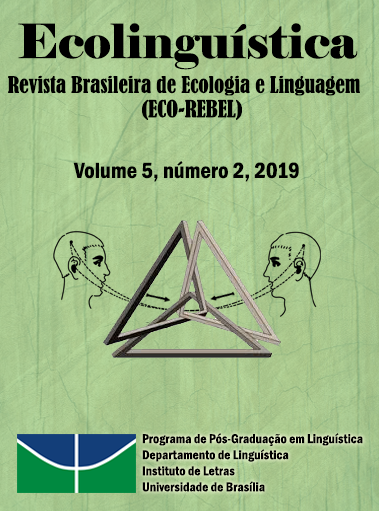Direitos humanos linguísticos na educação para a manutenção da língua
Keywords:
Direitos Linguísticos. Educação. Minorias Étnico-Linguísticas. Manutenção de Língua.Abstract
O objetivo básico deste artigo é discutir os direitos linguísticos das minorias linguísticas. Isso implica não só a defesa e manutenção de suas línguas e culturas, mas também o seu uso na educação, mesmo que aditivamente bilíngue. Se não, caímos no linguicismo (o preconceito contra as línguas das minorias) e no etnicismo (a ideia de que há “raças” superiores a outras). Do ponto de vista estritamente linguístico, essas ideologias podem levar a um genocídio linguístico, devido à divisão de poder baseada na língua e cultura monolíngue adotada pelos estados-nação. Para se contrapor a isso, é preciso observarem-se os direitos linguísticos. O artigo inclui algumas sugestões de como se implementar uma política favorável aos direitos dessas minorias.
Downloads
References
CLARK, D.; WILLIAMSON, R. (orgs). Self-Determination: International Perspectives. Londres: Macmillan, 1996.
COBARRUBIAS, J. 1983. Ethical issues in status planning. In: J. COBARRUBIAS, J.: FISHMAN, J.A. (orgs.). Progress in Language Planning: International Perspectives. Berlim: Mouton, 1983, p. 41-85.
CUMMINS, J. Negotiating Identities: Education for Empowerment in a Diverse Society. Ontario, Calif.: California Association for Bilingual Education, 1996.
CUMMINS, J. (org). 1998. Bilingual Education: The Encyclopedia of Language and Education. Dordrecht: Kluwer Academic, 1998.
DAES, E.-I. 1995. Redressing the balance: The struggle to be heard. Comunicação lida no Global Cultural Diversity Conference. Sydney, 26-28 de abril de 1995.
EIDE, A. Economic, social, and cultural rights as human rights. In: EIDE, A.; KRAUSE, C.; ROSAS, A. (orgs.). Economic, Social, and Cultural Rights: A Textbook. Dordrecht/Boston/Londres: Martinus Nijhoff Publishers, 1995, p. 21-40.
HARMON, D. The status of the world's languages as reported in Ethnologue. Southwest Journal of Linguistics 14, 1995, p. 1-33.
KOCH, E., and S. MASLAMONEY. 1997. Words that click and rustle softly like the wind. Mail and Guardian, September 12-18,1997:28-29.
KRAUSS, M. 1992. The world's languages in crisis. Language 68:4-1o.
MAFFI, L., T. SKUMABB-KANGAS, and J. ANDRIANARIVO. Linguistic diversity. In: POSEY, D. A. (org.). Cultural and Spiritual Values of Biodiversity. London and Nairobi: Intermediate Technology Publications and UNEP, 1999, p. 21-57.
ROTHENBERGER, A., comp. Bibliography on the OSCE High Commissioner on National Minorities: Documents, Speeches and Related Publications. The Hague: Foundation on Inter-Ethnic Relations, 1997.
SKUMABB-KANGAS, T. Bilingualism or Not: The Education of Minorities. Clevedon: Multilingual Matters, 1984.
SKUTNABB-KANGAS, T. Multilingualism and the education of minority children. In: ed. T. SKUTNABB-KANGAS and J. CUMMINS (orgs.). Minority Education: From Shame to Struggle, Pp. 9-44. Clevedon: Multilingual Matters, 1988.
SKUTNABB-KANGAS, T. 1990. Language, Literacy, and Minorities. London: Minority Rights GROUP.
SKUTNABB-KANGAS, T. Educational language choice ”“ Multilingual diversity or monolingual reductionism? In: Hellinger, M.; Ammon, U. (orgs.). Contrastive Sociolinguistics, Part III, Language Planning and Language Politics. Berlin/New York: Mouton de Gruyter, 1996a, p. 175-204.
SKUTNABB-KANGAS, T. Promotion of linguistic tolerance and development. In: LÉGER, S. (org.). Vers un agenda linguistique: Regard futuriste sur les Nations Unies /Towards a Language Agenda: Futurist Outlook on the United Nations. Ottawa: Canadian Centre for Linguistic Rights, University of Ottawa, 1996b, p. 579-629.
SKUTNABB-KANGAS, T. Human rights and language wrongs ”“ A future for diversity. In: ed. BENSON, P.; GRUNDY, P.; SKUTNABB-KANGAS, T. (orgs.). Language Rights, Special issue, Language Sciences 1998a, 20(1):5-27.
SKUTNABB-KANGAS, T. Human rights and language policy in education. In: WODAK, R.; CORSON, D. (orgs.). The Encyclopedia of Language and Education, vol. 1: Language Policy and Political Issues in Education. Dordrecht: Kluwer Academic, 1998b, p. 55-65.
SKUTNABB-KANGAS, T. Linguistic Genocide in Education ”“ or Worldwide Diversity and Human Rights? Mahwah, NJ.: Lawrence Erlbaum, 2000.
SKUMABB-KANGAS, T., BUCAK, S. Killing a mother tongue ”“ How the Kurds are deprived of linguistic human rights. In: SKUTNABB-KANGAS, T.; PHILLIPSON, R. in collaboration with M. RANNUT. Linguistic Human Rights: Inequality or Justice in Language Policy. Berlim/New York: Mouton de Gruyter, 1994, p. 347-370.
SMOLICZ, J.J. Culture and Education in a Plural Society. Canberra: Curriculum Development Centre, 1979.
SMOLICZ, J. J. National language policy in the Philippines. In: SPOLSKY, B. (org.). Language and Education in Multilingual Settings. Clevedon and Philadelphia: Multilingual Matters, 1986, p. 96-116.
Downloads
Published
How to Cite
Issue
Section
License
Authors who publish in this journal agree to the following terms:
Authors retain copyright and grant the journal the right of first publication. The work is simultaneously licensed under the Creative Commons Attribution License allowing the sharing of the work with acknowledgment of the authorship of the work and initial publication in this journal.
Authors are authorized to enter into additional contracts separately for non-exclusive distribution of the version of the work published in this journal (e.g., publishing in institutional repositories or as book chapters), with acknowledgment of authorship and initial publication in this journal.
Authors are allowed and encouraged to post and distribute their work online (e.g., in institutional repositories or on their personal page) at any point before or during the editorial process, as this can bring about productive revisions as well as increase impact.
Citation of published works (See The Effect of Free Access).



3.png)



